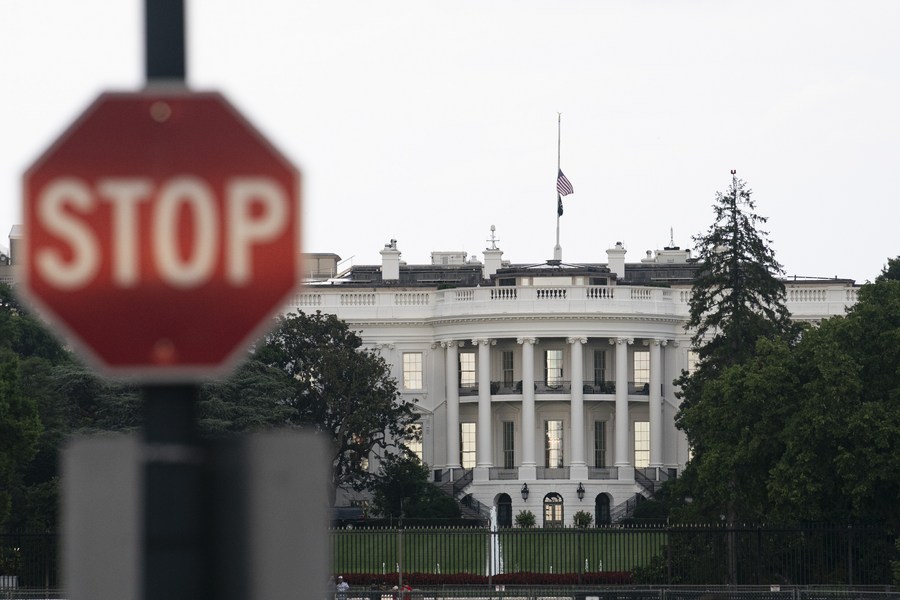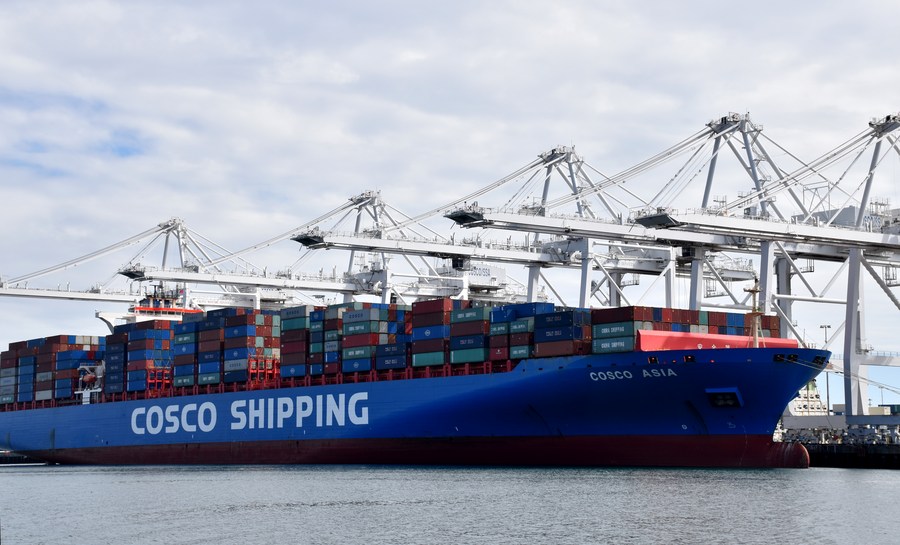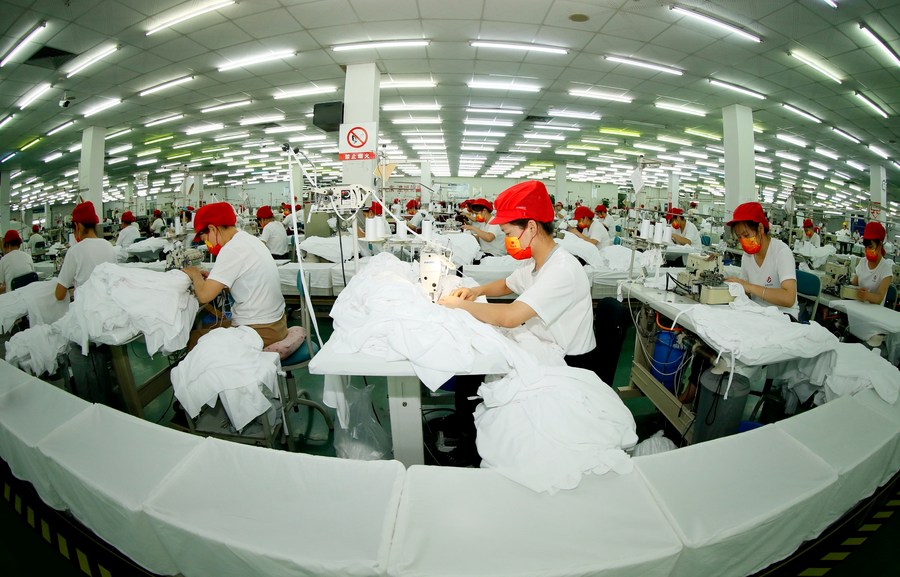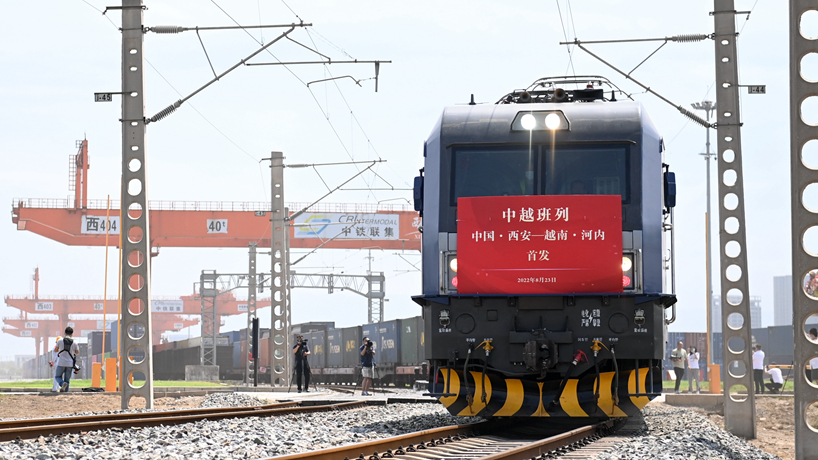
Photo taken on Aug. 4, 2022 shows the White House and a stop sign in Washington, D.C., the United States. (Xinhua/Liu Jie)
While it has been seeking to divide and re-devise the global supply chains, the United States is in fact politicizing and weaponizing science and technology, backtracking on its commitment to a free market, and undermining international trade rules.
by Xinhua writer Wang Xinyi
BEIJING, Aug. 26 (Xinhua) -- In its latest attempt to decouple from China, the United States has signed into law a new chips act, and is scrambling to form a chip clique and forcing its companies to move back their production lines.
Apparently, Washington is seeking to tailor-make its own "global" semiconductor supply chains and kick China out of the game. And it is trying to justify its push for supply-chain reshoring by manufacturing fallacies about the Chinese economy.
These moves only add another column to Washington's long list of protectionist alliances or schemes targeting Beijing, formed in one name or another.
For many years, some Washington zero-summers and arrogant Western media outlets have been consistent in China-bashing but inconsistent in how they frame China's role in the global economy.
To press for a "decoupling from China," they would try to belittle the global significance of the Chinese economy. But when they try to make a case for a "Chinese drag on the global economy," they would shift their tone and choose to hype up China's economic clout. Such self-contradictory narratives clearly expose their deeply-entrenched prejudice towards China, as well as an ego to maintain global supremacy for as long as they can.

Containers of China COSCO Shipping Corporation Limited are seen at the Port of Long Beach in Los Angeles County, the United States, Feb. 27, 2019. (Xinhua/Li Ying)
According to their Cold-War mentality, a China that has been growing ever stronger without following the so-called Westernization formula is a heretic, an eyesore and even an adversary, and should be either remolded or simply put down. Thus such an attempt by Washington to take China out from the global economy is anything but a surprise.
While it has been seeking to divide and re-devise the global supply chains, the United States is in fact politicizing and weaponizing science and technology, backtracking on its commitment to a free market, and undermining international trade rules.
But for sober minds, decoupling from China isn't just perilous, but impossible. Any attempt to decouple from China risks decoupling from perhaps one of the world's largest markets.
In fact, the more America talks of decoupling from China, the more business insiders have realized just how irreplaceable the Chinese economy is in the global industrial and supply chains.
In the first half of this year, China's paid-in FDI grew by 21.8 percent year on year. In the second quarter, 91 percent of foreign-invested companies maintained or expanded their operations in China. Recent survey reports showed that more than 60 percent of American-invested companies and 70 percent of German-invested companies plan to increase investment in China.
Just like countries de-dollarize themselves to hedge against spillover risks from the U.S. economy, blocking Chinese tech companies' access to U.S. technologies, for instance, may just encourage foreign companies to diversify their supply chain portfolio in case of another protectionist measure from Washington.
Globalization without China is not globalization and "decoupling from China" is completely empty talk, Yuki Izumikawa, an official of the Japanese Association for the Promotion of International Trade, told Xinhua.
Ronnie Lins, director of the China-Brazil Center for Research and Business, has compared "decoupling from China" to the removal of the engine and wheels from a vehicle.
In fact, China's leap from poverty to prosperity and openness stands as a vivid testimony to how integral it is for an economy to stay open, inclusive and reform-friendly.

Workers make clothes for export at a company in Taihe County, east China's Anhui Province, May 26, 2022. (Photo by Liang Xiaopeng/Xinhua)
China's economy is not a small pond, but a vast ocean that can potentially keep all ships afloat. China is a booster for the world economy, not a drag, and an opportunity for shared dividends, not a threat. Despite short-term setbacks, its economic fundamentals will continue to sustain long-term growth.
As a cascading series of crises are plaguing millions of people worldwide, any attempt to deliberately create economic decoupling, technological blockades, and industrial chain disruptions is egregious and will boomerang.
Washington should stop breaching international rules and roiling the global market, and get down to improve rather than decouple supply ties. ■












